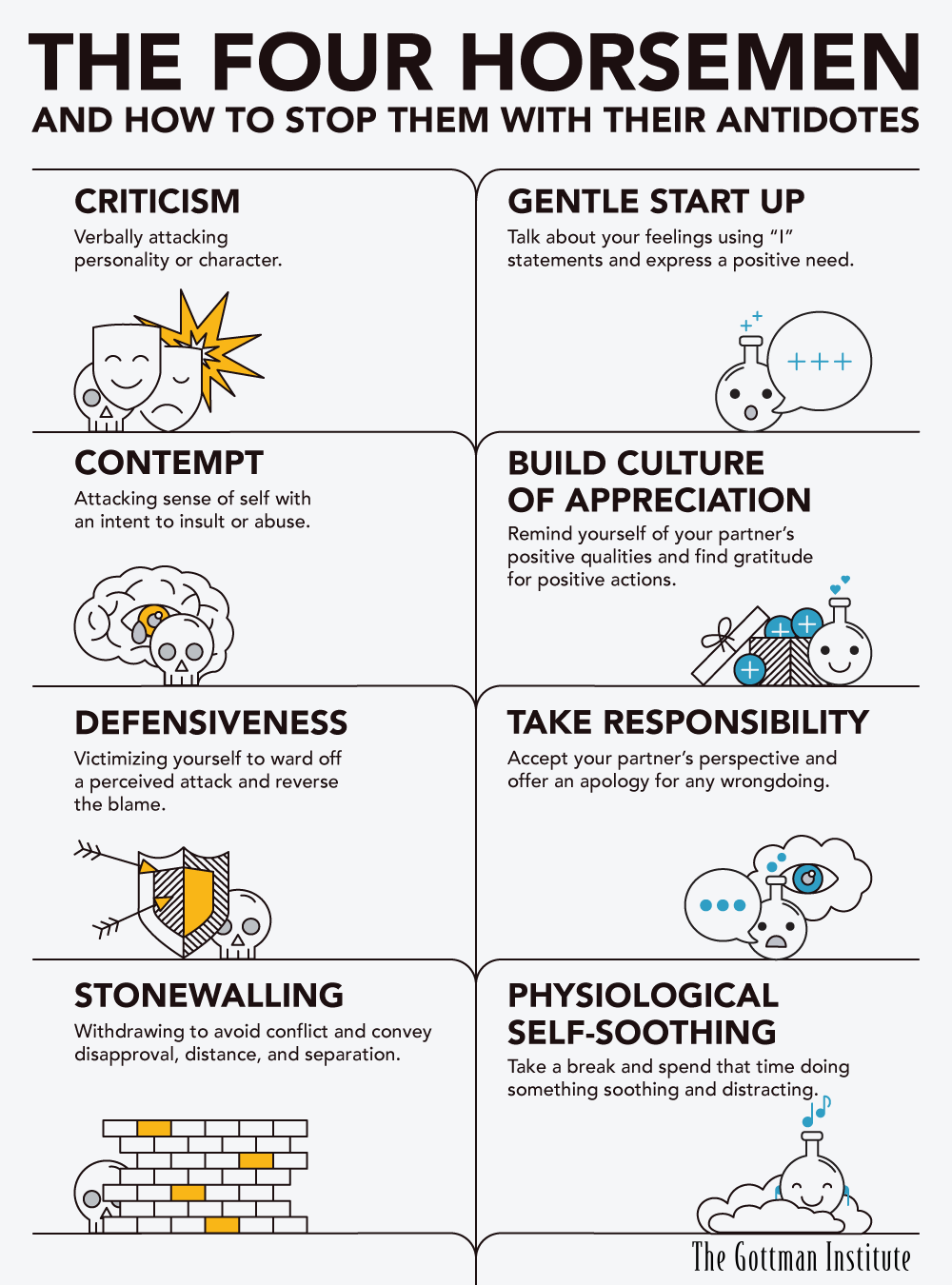
Over the years I have had the opportunity to do marriage counseling and coaching with hundreds of couples in a variety of settings. Each couple was unique in their own way, but often times there was a common issue among the couples. That issue had to do with how the couples communicated with each other. Their words, their tone, their facial expressions. All of these make a huge difference!
One of my favorite wisdom quotes is “encourage one another and build each other up” and this is a great standard for couples to strive for, and adhere to, when communicating to each other.
Dr. John Gottman, one of the true leaders in the field of marriage counseling, refers to The Four Horseman of the Apocalypse as a sign that a marriage is in serious trouble. As shown in the Gottman Institute graphic above, the Four Horseman are Criticism, Contempt, Defensiveness and Stonewalling and they usually appear in a marriage in that order.
Let’s take a look at each of The Four Horseman and their Antidotes:
- Criticism— It is normal to occasionally have some complaints about your spouse. The problem is when those complaints express negative feelings or opinions about the other person’s character or personality and the person is verbally attacked. The phrases “you always” or “you never” are signs that criticism is happening.
Antidote to Criticism–Instead of harshly starting a complaint that can then easily turn into criticism, try a gentle start to discussing the issue at hand, and talk about your feelings or hurts using “I” statements.
- Contempt–This second horseman occurs when one person feels superior to the other. It is a form of disrespect that is intentionally insulting or abusive to their partner.
Antidote to Contempt–Instead of focusing on negative thoughts about your partner, remind yourself of why you fell in love with your partner in the first place. Focus on your partners positive qualities and be grateful for any of their positive actions in order to develop a culture of appreciation in the relationship.
- Defensiveness–Defensiveness is really a way of blaming your partner for the problem. Whether victimizing yourself, or taking an innocent victim stance, defensiveness usually just escalates the conflict.
Antidote to Defensiveness–While it is understandable to want to defend yourself while feeling attacked, it may be wiser to see where you can take responsibility for at least part of the issue or conflict. Try to accept your partner’s perspective and apologize for any wrongdoing on your part. From here some healing and compromise can occur.
- Stonewalling–In relationships where conflict starts harshly then morphs into criticism, contempt and defensiveness, what happens is that eventually one partner will opt to tune out. Maybe by watching TV, playing video games, or staring at their phone. This is stonewalling and the goal of someone stonewalling is to avoid a fight while at the same time communicate their disapproval to their partner. Stonewalling is very dangerous and prevents compromise and healing.
Antidote to Stonewalling–Gottman’s research indicates that when couples reach the point of stonewalling they usually are very upset and have elevated heart rates. The research showed that by pausing to take a break and self soothe (read, go for a walk, etc.) the couples relaxed and were able to return and discuss the issue in a healthy way.
For further reading I encourage you to check out the resources at The Gottman Institute.
The Four Horseman are definitely to be avoided in marriage. Feel free to contact me if you notice any of the horseman making an appearance in your relationship.
Phone: 949-303-8264
Email: randy@randymoraitis.com
Website: www.randymoraitis.com
Facebook: https://www.facebook.com/RandyMoraitisCoach/
Instagram: @randymoraitis
About Randy Moraitis, MA, CIP, BCPC
Randy is married to Kim and they live in Laguna Niguel. Together they have a blended family of five adult children and three beautiful grandchildren. (If you don’t believe Randy, he will gladly show you pictures!)
Randy is a Certified Intervention Professional (CIP) and expert in helping families and individuals affected by addiction and/or mental health issues through counseling, coaching and interventions. He is an award-winning Board Certified Pastoral Counselor and is both licensed and ordained as a pastoral counselor. He has five professional coaching certifications and loves working with clients on executive coaching, life coaching, wellness coaching and recovery coaching. Randy has a master’s degree with emphasis in theology and counseling, a bachelor’s degree in management and leadership, and a certificate in health and fitness with emphasis in exercise physiology and sports psychology from UC Irvine. He has been leading groups, individuals and families to mental, physical, emotional, and spiritual health in Orange County for over 25 years. His office is located in Laguna Niguel, CA.




